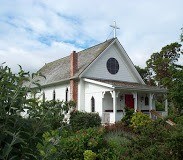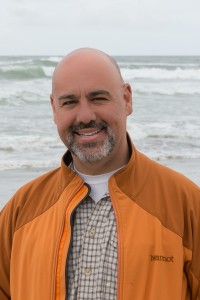— by Margie Doyle —
Jose Roberto Gándara-Perea, “Berto’s” life path has drawn him from Puerto Rico to Germany, from the Dominican Republic to Belgium, from Harlem to Orcas Island. Now, since August, it has brought him to a pastoral resting place at Emmanuel Episcopal Church on Orcas Island.
The parish, in its historic waterfront church, has been an Orcas Island landmark since 1885 , and Berto says, now its greatest challenge is its image as “old and stuffy and traditional.” But that’s a “false perception.”
Berto says, “It takes guts to call a Latino, gay man to be pastor, knowing it will cause controversy.” He’s found the community to be open to questions and stretching their own beliefs; welcoming people of different beliefs. They are committed to “truly live out the message of Jesus; their main issue is how to serve the community and be a place of dialogue.”
Service and dialogue have been a part of Berto’s character since his childhood in Puerto Rico and Germany. He has “always been drawn to spirituality… to something more in life’s meaning and purpose.”
He was born into a Roman Catholic family, and after education with the Benedictine order, where “the contemplative mystical side of the presence of God” was strong, he came under the influence of Liberation Theology, which, he describes as “denouncing oppression, critical of social order, and dedicated to the needs of the people and cries of the poor.”
He studied for the Roman Catholic priesthood in France with the Redemptorist order, which he jokingly referred to as “the Jesuits of the poor,” combining that order’s intellectualism with the ministry to the poor. Ordained a Redemptorist priest, he was a missionary to Haiti and the Dominican Republic, where the order sold their seminary and moved to a shantytown.
There electricity and water were in short supply, and he studied by candlelight and took his turn filling water buckets late at night, when the water was running. “I miss the simplicity of the people, their joy, generosity and welcoming spirit,” Berto says. He recalls a boy whose legs were paralyzed, and whose group of friends shouldered him around as a natural part of their group. He tells another story where he told a shoe shine boy he had nothing to give him; only to have the beggar turn around and offer him a fritter to eat.
As the years went by, he earned philosophy and theology degrees, among other post-graduate degrees. In 1996, he began a three-year education program at a Jesuit school in Belgium, part of “the more progressive side of the Catholic Church,” seeking answers to his questions about Christian unity, the role of women and human sexuality. “It was a step back to reconcile the formal teachings of the Catholic Church” with his own experience and beliefs, he says. “I came back and discerned I needed to be honest with myself and the people and the people I serve.”
He attended the General Theological Seminary in New York City, taking up Anglican studies. He described the chief differences between Anglican and Roman Catholic beliefs by saying the Anglicans are not under the Pope’s authority; they have women and gay priests; and the laity has more say in the church’s organization.
As an Episcopalian priest, he then ministered to a church in Harlem. In 2005, he met his partner, Hugh McPhail Grant, also an Episcopal priest, and a licensed clinical social worker. They have been married since 2009.
Last year, they came to Orcas for an extended visit. Berto, soon became involved in the Buddha Barn, Ecstatic Dance at the Odd Fellows, Bhajan chanting and the Orcas Mandala Studio. He’s introduced himself to the Funhouse, the Lions, Montessori School and the Grange, and is a school volunteer for the English Language Learning (ELL) program. Earlier this year, he began looking for work here and in other places. The leadership of the Episcopal Parish “evolved pretty neatly,” he says.
In addition to serving the Emmanuel Episcopal congregation, he does translation services and webpage design, and will consider “whatever comes around.”
He says he’s “pretty open spiritually.” He has been drumming for years, finding it a “meditative, soothing; also profound and deep” experience. Buddhism, chanting, Druidism, and other spiritual experiences “express the common desire, through different words, to reach beyond ourselves,” he says.
He hopes to serve the Latino community and children, and reach out to parents. He’s also anticipating starting a workshop in contemplative photography, developed from a Buddhist class he took in Colorado call “miksang” or “good eye” in which one looks at the image in the camera’s lens with “fresh eyes.” “You stop yourself before analyzing, trust your perception and take the picture.”
He intends that his Sunday sermons will “give to the people who come a place where they feel welcomed as they are; where they feel deeply loved ‘in broken-ness.’ Where they’re not outsiders: challenged to grow, but loved as they are.”
He has been caught up in “the excitement of a community of people who want to work and give of themselves; who think for themselves and truly live out the message of Jesus, serve the community and be welcoming.”
**If you are reading theOrcasonian for free, thank your fellow islanders. If you would like to support theOrcasonian CLICK HERE to set your modestly-priced, voluntary subscription. Otherwise, no worries; we’re happy to share with you.**








